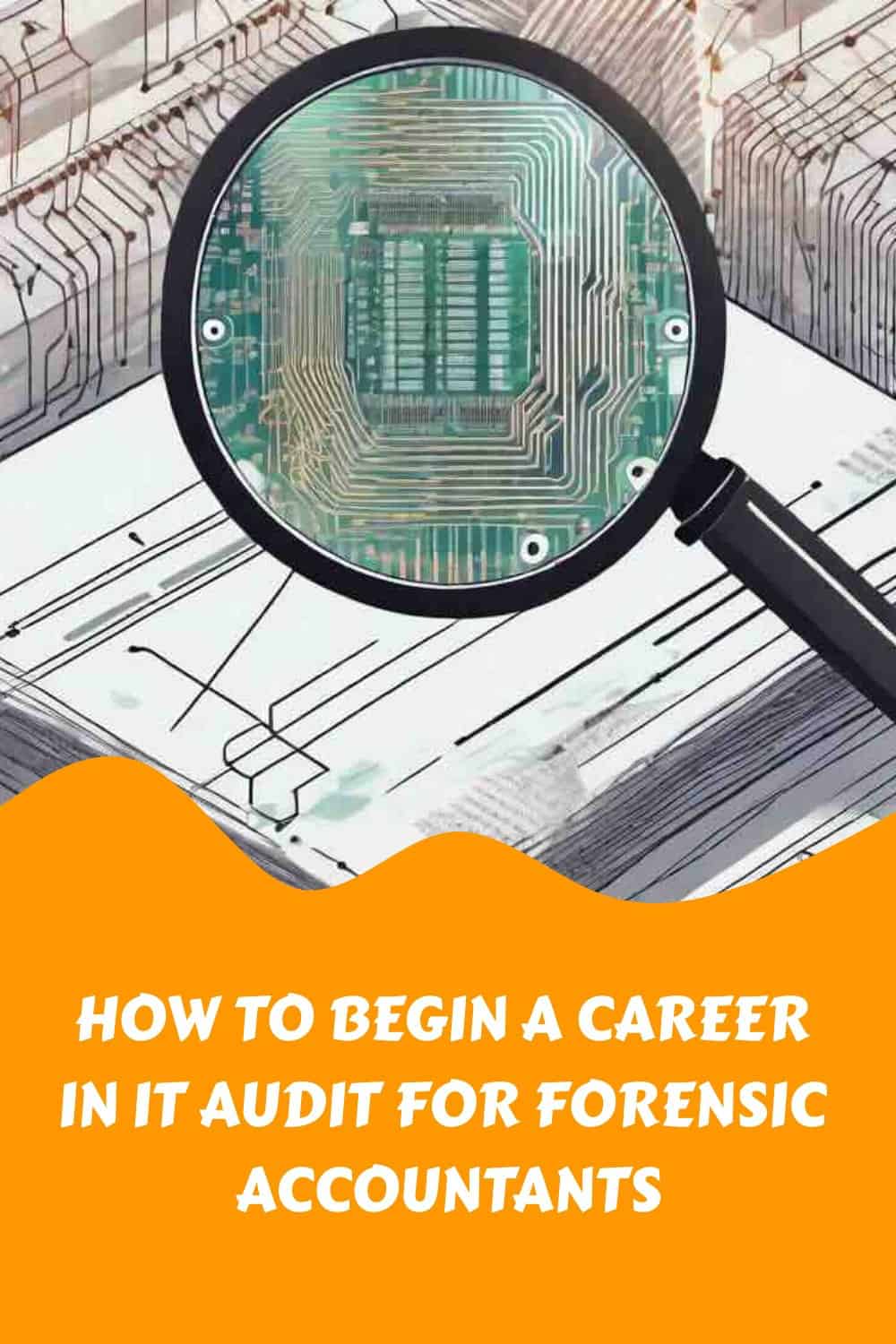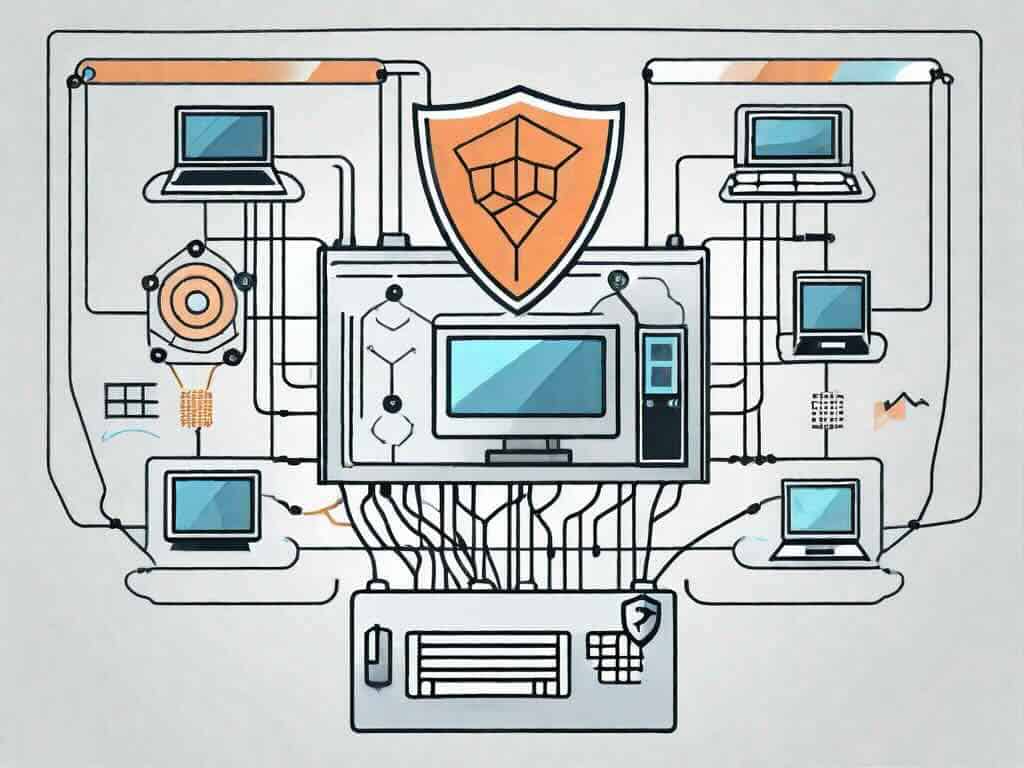
If you are a forensic accountant looking to explore new career opportunities and expand your skill set, a career in IT audit could be a promising path to consider. In this article, we will delve into the key aspects of starting a career in IT audit for forensic accountants. From understanding the role of an IT auditor in forensic accounting to exploring the educational requirements and job market opportunities, we will provide you with valuable insights to help you navigate this exciting field.
Understanding the Role of an IT Auditor in Forensic Accounting
Before embarking on a career in IT audit, it is essential to understand clearly the role and responsibilities that come with it. As an IT auditor specializing in forensic accounting, your primary objective is to ensure the integrity, confidentiality, and availability of financial data within an organization. You will be responsible for assessing the organization’s information systems and processes to identify any potential risks or vulnerabilities that might impact the accuracy of financial records or compromise the overall security posture.
As an IT auditor, you play a crucial role in safeguarding the financial well-being of an organization. Your expertise in both IT systems and forensic accounting principles allows you to bridge the gap between technology and finance. By evaluating the design and effectiveness of IT controls, you can identify areas where improvements are needed to protect against potential threats. This includes conducting risk assessments and identifying vulnerabilities that malicious actors could exploit.
One of the key responsibilities of an IT auditor in forensic accounting is reviewing and testing IT systems for compliance with regulatory requirements. This involves ensuring that the organization’s financial processes align with industry standards and legal obligations. By meticulously examining the systems and processes in place, you can detect any deviations from the required standards and take appropriate action to rectify them.
Another important aspect of your role as an IT auditor is investigating incidents of fraud or financial irregularities. Your analytical skills and attention to detail enable you to identify patterns or anomalies in financial data that may indicate fraudulent activities. You can gather evidence and provide valuable insights to support legal proceedings or internal disciplinary actions by conducting thorough investigations.
As technology continues to evolve rapidly, it is crucial for IT auditors in forensic accounting to stay up-to-date with the latest advancements. Monitoring changes in technology and implementing necessary updates is essential to maintain data integrity and protect against emerging threats. By proactively adapting to technological advancements, you can ensure that the organization’s financial data remains secure and accurate.
Skills Required for an IT Auditor in Forensic Accounting
To excel in a career in IT audit for forensic accountants, you will need a combination of technical, analytical, and soft skills. Some of the key skills required include:
- Strong knowledge of IT systems and networks: As an IT auditor, you must deeply understand various IT systems and networks to assess their security and integrity effectively.
- Understanding of forensic accounting principles and financial regulations: A solid grasp of forensic accounting principles and financial regulations is essential to identify potential risks and ensure compliance.
- Analytical and problem-solving skills: The ability to analyze complex data, identify patterns, and solve problems is crucial in detecting and preventing financial irregularities.
- Attention to detail and ability to spot anomalies: A keen eye for detail is necessary to identify any irregularities or discrepancies in financial data that may indicate fraudulent activities.
- Effective communication and teamwork: As an IT auditor, you will collaborate with various stakeholders, including finance professionals, IT specialists, and legal teams. Effective communication and teamwork skills are vital to ensure smooth collaboration and the successful implementation of audit recommendations.
Educational Requirements for IT Audit Career
When it comes to pursuing a career in IT audit, having the right educational background is crucial. Here are the relevant degrees and certifications that can help you establish a strong foundation:
Obtaining a degree in accounting, finance, or information systems can provide you with a solid educational foundation for a career in IT audit. These degrees will equip you with the necessary knowledge and skills to understand financial systems, analyze data, and assess risks in the context of information technology.
Additionally, pursuing professional certifications can further enhance your credibility and demonstrate your expertise in the field. One such certification is the Certified Information Systems Auditor (CISA) designation. This globally recognized certification validates your ability to assess vulnerabilities, report on compliance, and implement controls within an organization’s IT infrastructure.
Another valuable certification for IT auditors is the Certified Fraud Examiner (CFE) designation. This certification focuses on fraud prevention, detection, and investigation, which are crucial skills in the field of IT audit. With this certification, you will be equipped to identify potential fraudulent activities, assess their impact on an organization, and develop strategies to mitigate risks.
Importance of Continuous Learning in IT Audit
In the rapidly evolving world of technology, continuous learning is essential to stay ahead of the curve in the field of IT audit. As new technologies emerge and existing ones evolve, IT auditors must adapt their skills and knowledge to assess risks and effectively provide valuable insights to organizations.
Continued professional development through attending seminars and workshops and gaining specialized knowledge are crucial for IT auditors. These opportunities allow you to stay updated with the latest trends, best practices, and regulatory requirements in the field. By actively participating in such events, you can expand your network, learn from industry experts, and gain valuable insights into emerging technologies.
Embracing changes and keeping up with emerging technologies will enable you to adapt quickly to new challenges and opportunities in IT audit. By continuously learning and upgrading your skills, you can position yourself as a trusted advisor to organizations, providing them with valuable insights and recommendations to enhance their IT governance, risk management, and compliance processes.
Transitioning from Forensic Accounting to IT Audit
If you already have a background in forensic accounting, you have a valuable foundation to build upon when transitioning to IT audit. Here’s how you can leverage your forensic accounting experience:
Leveraging Your Forensic Accounting Experience
As a forensic accountant, you possess invaluable data analysis, financial investigation, and risk assessment skills. These skills can seamlessly transfer to the field of IT audit, enabling you to analyze complex financial data within technological environments and uncover potential risks or fraudulent activities.
When transitioning to IT audit, your expertise in data analysis becomes even more critical. In this role, you will be responsible for examining large volumes of data stored in various systems and databases. Your ability to identify patterns, anomalies, and potential irregularities will be instrumental in ensuring the integrity of financial information.
Furthermore, your experience in financial investigation will prove beneficial in IT audit. While forensic accounting focuses on uncovering financial fraud or misconduct, IT audit involves investigating potential breaches in data security, unauthorized access, or improper use of technology resources. Your expertise in conducting thorough investigations and gathering evidence will be invaluable in identifying potential IT risks and vulnerabilities.
Bridging the Gap: Learning New IT Audit Skills
While your forensic accounting skills provide a strong foundation, bridging the gap is crucial by acquiring new technical skills specific to IT auditing. Familiarize yourself with various IT frameworks, data analysis tools, and audit methodologies. This will enable you to effectively assess IT controls, audit system designs, and identify potential vulnerabilities.
One area of focus should be on understanding IT governance frameworks such as COBIT (Control Objectives for Information and Related Technologies) or ITIL (Information Technology Infrastructure Library). These frameworks provide guidelines and best practices for managing and auditing IT processes, ensuring organizations have appropriate control to mitigate risks.
Additionally, gaining proficiency in data analysis tools such as ACL (Audit Command Language) or IDEA (Interactive Data Extraction and Analysis) will enhance your ability to extract, manipulate, and analyze large datasets. These tools can help you identify trends, anomalies, and potential control weaknesses, enabling you to provide valuable insights and recommendations to management.
Moreover, familiarizing yourself with audit methodologies specific to IT, such as the Control Objectives for Information and Related Technology (COBIT) framework, will enable you to assess IT controls effectively. Understanding the key control objectives and control activities within an IT environment will allow you to identify gaps and make recommendations to strengthen the overall control environment.
Expanding your skill set to include these IT audit-specific tools and methodologies will position you as a well-rounded professional capable of effectively assessing and mitigating IT risks.
Job Market and Opportunities in IT Audit
The demand for skilled IT auditors is on the rise, making it an opportune time to pursue a career in this field. Here’s a glimpse of the current job market trends and future prospects:
Current Trends in the IT Audit Job Market
A growing number of organizations are recognizing the importance of robust IT audit practices to safeguard their financial data. As a result, there is an increasing demand for IT auditors with expertise in forensic accounting. This trend will likely continue as technology advances, creating new risks and challenges.
In addition to the demand for forensic accountants, there is also a rising need for IT auditors who specialize in cybersecurity. With the increasing frequency and sophistication of cyber attacks, organizations are investing heavily in strengthening their cybersecurity measures. This has created a significant demand for IT auditors who can assess and enhance the security of an organization’s IT infrastructure.
Furthermore, the globalization of businesses has led to an expansion of IT audit job opportunities. As companies expand their operations across borders, they face unique challenges in terms of compliance with international regulations and standards. IT auditors with knowledge of international laws and regulations are highly sought after to ensure that organizations remain compliant and secure.
Future Prospects in IT Audit for Forensic Accountants
The future prospects for forensic accountants transitioning to IT audit are promising. With the proliferation of technology and the increasing focus on data security and fraud prevention, the demand for skilled professionals who can bridge the gap between financial analysis and technological systems is expected to grow significantly.
As technology continues to evolve, so do the methods used by fraudsters. This creates a constant need for IT auditors who can stay ahead of the curve and develop innovative strategies to detect and prevent fraud. Forensic accountants, with their strong financial analysis and investigation background, are well-positioned to excel in this field.
Moreover, the role of IT auditors is expanding beyond traditional financial audits. Organizations are increasingly relying on IT auditors to assess the effectiveness of their internal controls and risk management processes. This broader scope of responsibilities opens up new avenues for forensic accountants to apply their skills and contribute to the overall success of an organization.
In conclusion, the job market for IT auditors, especially those with a background in forensic accounting, is thriving. The current trends indicate a growing demand for professionals who can address the challenges posed by technology and ensure organizations’ security and compliance. With the future prospects looking promising, pursuing a career in IT audit can lead to exciting and rewarding opportunities.
Preparing for Your First IT Audit Role
As you embark on your journey to secure your first IT audit role, there are several key steps you can take to position yourself for success:
First and foremost, building a competitive resume that stands out from the crowd is important. Highlight your forensic accounting experience, relevant educational qualifications, and any certifications you have obtained. Showcase your ability to analyze complex financial data and your understanding of IT systems and controls. This will demonstrate to potential employers that you have the necessary skills and knowledge to excel in an IT audit role.
In addition to a strong resume, acing the IT audit job interview is crucial. Prepare for job interviews by reviewing common interview questions and practicing your responses. Research the company you are interviewing with and familiarize yourself with their IT infrastructure and systems. This will allow you to showcase your knowledge of technology and its impact on forensic accounting. Furthermore, be prepared to demonstrate your ability to apply analytical thinking to identify potential risks and vulnerabilities within IT systems. Employers are looking for candidates who can think critically and proactively address potential issues.
Another important aspect of preparing for your first IT audit role is staying up-to-date with the latest industry trends and developments. The field of IT audit is constantly evolving, and staying current with emerging technologies, regulatory changes, and best practices is essential. This can be achieved through attending industry conferences, participating in professional development courses, and engaging with online communities and forums.
Networking is also a valuable tool in securing an IT audit role. Connect with professionals in the field through industry events, LinkedIn, and other networking platforms. Building relationships with experienced IT auditors can provide valuable insights, mentorship, and potential job opportunities.
Lastly, it is important to continuously enhance your skills and knowledge in IT auditing. Seek opportunities to expand your expertise by taking on challenging projects, pursuing additional certifications, and staying curious about new technologies and methodologies. Employers value candidates who are committed to professional growth and continuous learning.
By following these steps and investing time and effort into your career development, you can position yourself for success in your first IT audit role. Remember to stay proactive, adaptable, and passionate about the field, and you will be well on your way to a rewarding career in IT audit.
Navigating Career Progression in IT Audit
Once you have secured your first IT audit role, you can explore various paths for career progression. Here are some strategies to advance your career:
Potential Career Paths and Roles in IT Audit
As you gain experience in IT audit, you can pursue specialized roles such as IT audit manager, senior IT auditor, risk management analyst, or even IT audit director. These positions will allow you to take on more complex projects, lead teams, and further develop your expertise in the field.
As an IT audit manager, you will be responsible for overseeing the entire IT audit process within an organization. This includes planning and executing audits, managing a team of auditors, and ensuring compliance with regulatory requirements. You will also be involved in developing audit strategies, identifying areas of risk, and providing recommendations for improvement.
As a senior IT auditor, you will be responsible for conducting detailed audits of an organization’s IT systems and processes. You will assess the effectiveness of controls, identify potential vulnerabilities, and make recommendations for enhancing security and efficiency. In this role, you will also collaborate with other departments, such as finance and operations, to ensure alignment and integration of IT audit findings.
As a risk management analyst, you will focus on identifying and mitigating IT systems and processes risks. You will work closely with stakeholders to understand their risk appetite and develop strategies to minimize potential threats. This role requires a strong understanding of both IT audit principles and risk management frameworks.
Strategies for Career Advancement in IT Audit
Continued professional development is crucial for career advancement in IT audit. Pursuing certifications such as Certified Information Systems Auditor (CISA) or Certified Internal Auditor (CIA) can enhance your credibility and open doors to new opportunities. Additionally, it is essential to stay updated with the latest trends and best practices in IT audits. Attend industry conferences, participate in webinars, and join professional associations to expand your knowledge and network with industry professionals.
Networking plays a significant role in career advancement. Building relationships with colleagues, mentors, and industry leaders can provide valuable insights, job opportunities, and guidance. Attend networking events, join online communities, and engage in conversations with fellow IT auditors to expand your professional network.
Seizing opportunities to expand your knowledge and skills is another effective strategy for career advancement. Volunteer for challenging projects, take on additional responsibilities, and seekopportunities to lead teams or initiatives. Demonstrating your ability to take on new challenges and deliver results will showcase your potential for growth and advancement.
Lastly, developing strong leadership abilities is crucial for advancing your career in IT audit. Take initiative, demonstrate problem-solving skills, and exhibit a proactive approach to your work. Seek supervisor and mentor feedback to identify improvement areas and work on developing your leadership skills.
In conclusion, starting a career in IT audit offers an exciting opportunity to combine your financial analysis skills with technology expertise. By understanding the various career paths and roles available in IT audit, pursuing continued professional development, networking with industry professionals, and seizing opportunities for growth, you can navigate your way to a successful and fulfilling career in this dynamic field.








